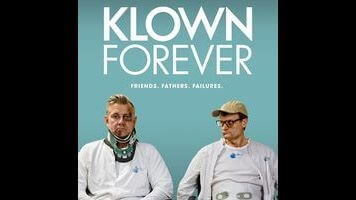The male psyche gets caught with its pants down in Klown Forever

Comedy is notoriously hard to translate, but apparently men are pigs in every language. At least, that’s what comes through in the Klown movies, based on the long-running Danish comedy series starring real-life famous comedians Frank Hvam and Casper Christensen as exaggerated versions of themselves. If you think that sounds like Larry David’s HBO sitcom Curb Your Enthusiasm, you’re correct. And the comparisons don’t stop there: Like Curb, Klown’s humor is based around its protagonists’ personal failings, and how those failings lead to awkward situations. There’s one key difference, though. On Curb, it’s Larry David’s neuroses that drive his frequent public humiliation. In Klown, the problem is more that Casper and Frank can’t keep it in their pants.
This blend of shock and cringe humor drove the duo’s first feature, 2010’s Klown, and is back for their new movie, Klown Forever. This time around, the action revolves around a friendship-testing trip to Los Angeles, where Casper suddenly, dramatically relocates early in the film, essentially ending his and Frank’s comedic partnership. Being a narcissist and a playboy by nature, Casper absolutely adores L.A.. Frank, on the other hand, has gotten even more timid and henpecked since the last time we saw him, an attitude that doesn’t gel very well with Casper’s celebrity neighbors. (Adam Levine, Isla Fisher, and Game Of Thrones’ Nikolaj Coster-Waldau all make cameos.) Soon, Casper delivers a devastating emotional blow to his longtime friend at a party, and Frank responds with an impulsive act whose consequences will be felt all the way back in Copenhagen.
The dynamic between the two men plays out in some outrageous and funny set pieces, like a trip to the pound to adopt a Great Dane that ends with an extended bestiality joke. But although both Hvam and Christensen are willing to quite literally bare all in the name of comedy, the blue streak is tempered with more subtle, character-based bits, like Frank’s flustered inability to find anything but mariachi stations on the radio in his rental car. This balance, it can be assumed, comes from Hvam and Christensen co-writing the screenplay, bringing each of their personal viewpoints into the story in the process.
While sometimes this specificity resonates, other times it’s alienating. Klown Forever is even less accessible to outsiders than the original, adding inside jokes that you really wouldn’t understand unless you saw the first movie—why Frank’s mother-in-law wears an eyepatch, for example—which is kind of a lot to ask of casual comedy fans. There are also some cultural references that don’t quite translate: Did you know that the “Lars” who shows up periodically throughout is Lars Hjortshøj, who appeared on a surrealist talk show with Hvam and Christensen back in the late ’90s? That’s okay, we didn’t either. That joke probably plays better in Denmark.
But that particular idiosyncrasy is inconsequential compared to the film’s sexual politics. Klown Forever occupies a tricky in-between space in this regard: Although the men’s cluelessness or crudity is always the punchline of the joke, the film does fall into the trap of portraying its female characters as either easily bedded sex objects or nagging killjoys. Frank’s wife Mia (Mia Lyhne) falls into the latter category, insisting on going through Frank’s phone every night and showing absolutely no sympathy for his emotional distress at losing his best friend and creative partner. Casper’s adult daughter Cille (Simone Colling) is the former, walking around in short-shorts and bikini tops and improbably, suggestively feeding fruit to her dad’s stodgy middle-aged friend. And toward the end of the film, there’s a sexual bargain made between Hvam and Christensen that would be all kinds of problematic if the movie didn’t call it off before it could actually happen.
And sure, Klown Forever does not claim to speak for all men, or even for the real Hvam and Christensen. The boorish behavior and broad caricatures are part of the joke, and to fail to acknowledge that is to miss the point. But when that same joke gets repeated over and over, after a while it’s not as funny anymore. If there’s to be a Klown Infinity, perhaps a fresh approach is required.